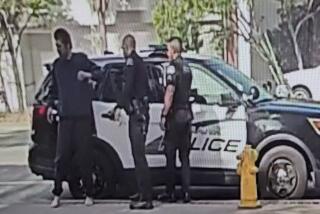Police Casework on 39th-Dalton Backed : Inquiry: An LAPD in-house report ordered by Mayor Bradley finds nothing improper in the investigation of four officers’ actions.
A Los Angeles police sergeant did not act improperly in his investigation into the activities of four fellow officers who face misdemeanor charges of vandalism in connection with the 39th and Dalton case, an in-house Police Department inquiry has determined.
The report was ordered by Mayor Tom Bradley following a Times report in which Sgt. Robert Kavanaugh said he had been working on behalf of the four officers’ defense team. Such activity would have constituted an apparent breach of policy; police officers are supposed to work only for prosecutors in bringing criminal defendants to justice.
The report is scheduled to be discussed today by the Board of Police Commissioners and considered for final approval.
Quoting Kavanaugh, his immediate police supervisors and defense attorney Michael Stone, the report concludes that Kavanaugh was acting in his role as a police representative defending officers against administrative cases in the 39th and Dalton case, and that he never crossed the line and helped prepare the criminal defense of the four officers who are being prosecuted for the 1988 police raid.
Kavanaugh, in his interview with The Times in October, admitted that he worked extensively as a criminal defense investigator assisting Stone. He said he conducted interviews, stakeouts and other criminal defense work out of Stone’s office, all with the approval of his department supervisors.
“It’s never been a secret,” he told a reporter. “I got a clear sign from my supervisors that it was OK to do it.”
The report concluded that Stone was careful not to include Kavanaugh in work on the criminal case. The report also said Kavanaugh’s superiors never gave him approval to help the criminal defense case, and that had he helped the case, they would have “taken steps to stop it.”
The report added that Kavanaugh felt his interview with The Times was taken out of context, and that he was only trying to describe the fine line between a police defense representative handling administrative matters, as opposed to a criminal defense investigator.
“The appearance of a crossover could exist,” the report said. “However, he (Kavanaugh) and other defense representatives never knowingly participated in such an arrangement because it would be a conflict of interest.”
The initial report on Kavanaugh’s activities not only prompted Bradley’s request for an investigation, but also outraged Christopher Darden, the deputy district attorney who is prosecuting the four officers for their roles in allegedly helping to destroy property in apartments near 39th Street and Dalton Avenue.
Darden said Monday that the police have yet to provide him with copies of all of Kavanaugh’s work materials in the case, despite pretrial court orders to turn the documents over to the prosecutor’s office.
“We haven’t got everything we want,” he said. “We believe he had interviews with certain potential witnesses and there are no documents covering those interviewes. It causes me to wonder why a police officer, knowing there is a discovery order, won’t disclose those interviews to me, the prosecutor.
“That kind of conduct suggests to me he is working for an interest other than justice. It suggests to me he is working probably for the criminal defense.”
Darden added that he is skeptical of the Police Department’s findings about Kavanaugh’s activities.
“They never even interviewed me,” he said. “I can’t imagine how they can do a thorough investigation without conferring with us first.”
Kavanaugh could not be reached for comment Monday.
More to Read
Sign up for Essential California
The most important California stories and recommendations in your inbox every morning.
You may occasionally receive promotional content from the Los Angeles Times.











